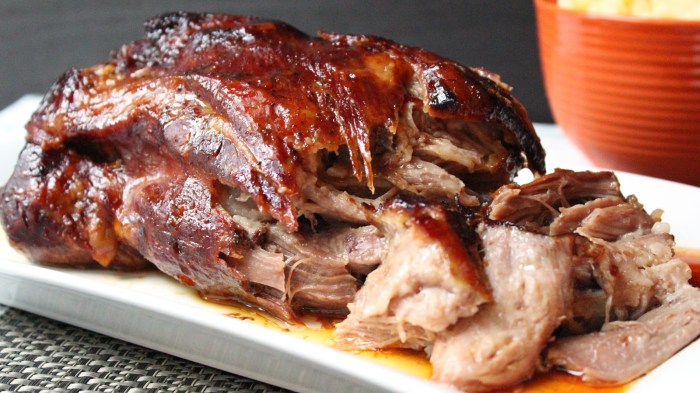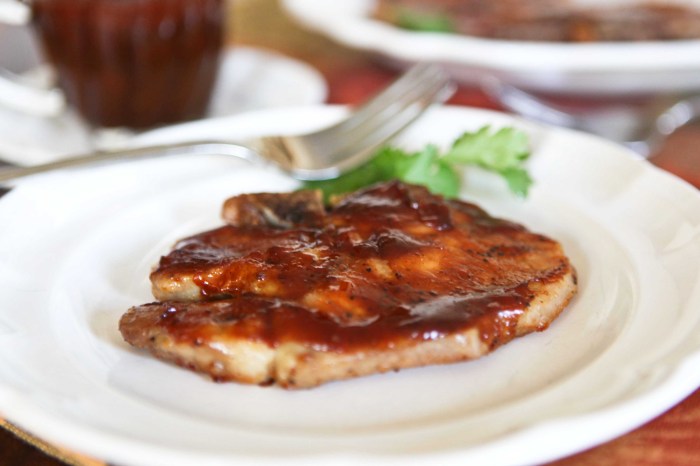BBQ Sauce and Pork: A Flavorful Pairing

Source: ingoodflavor.com
Many delicious BBQ sauce recipes for pork exist, varying widely in sweetness and spice levels. The versatility of BBQ sauce extends beyond pork, however; for instance, a fantastic application is found in the preparation of bbq sauce buffalo wings recipe , showcasing the sauce’s adaptability. Returning to pork, the depth of flavor achievable with a well-crafted BBQ sauce is truly remarkable, making it a cornerstone of many regional cuisines.
The combination of BBQ sauce and pork is a culinary classic, a testament to the enduring appeal of smoky, sweet, and savory flavors. BBQ sauce itself boasts a rich history, evolving from simple vinegar-based concoctions to the diverse range of regional styles we enjoy today. This exploration delves into the world of BBQ sauces, focusing on their application to pork, covering various recipes, techniques, and considerations for achieving perfect flavor harmony.
Introduction to BBQ Sauce and Pork, Bbq sauce recipes for pork
Barbecue sauce’s origins are somewhat murky, but its widespread use, particularly with pork, can be traced back centuries. Early versions were likely simple mixtures of vinegar, spices, and perhaps some sweeteners. Over time, regional variations emerged, reflecting local ingredients and culinary traditions. These regional styles often showcase unique flavor profiles, resulting in a diverse landscape of BBQ sauce experiences.
Examples include the vinegar-based sauces of Eastern North Carolina, the tomato-based and often sweeter Kansas City style, and the tangy and often dry-rub-focused Memphis style. A good BBQ sauce for pork should complement, not overpower, the inherent flavor of the meat. It needs a balance of sweetness, acidity, and savory notes, with a texture that clings to the pork without being overly thick or thin.
Basic BBQ Sauce Recipes for Pork

Source: cloudfront.net
These three recipes offer a starting point for exploring the world of BBQ sauce, showcasing variations in sweetness and spice levels. Each recipe provides a distinct flavor profile, ideal for different pork preparations.
| Name | Ingredients | Instructions | Notes |
|---|---|---|---|
| Sweet & Smoky BBQ Sauce | Ketchup, brown sugar, apple cider vinegar, Worcestershire sauce, smoked paprika, garlic powder, onion powder, black pepper | Combine all ingredients in a saucepan. Simmer over low heat for 30 minutes, stirring occasionally. | Pairs well with ribs and pulled pork. Adjust brown sugar for desired sweetness. |
| Tangy Carolina BBQ Sauce | Apple cider vinegar, brown sugar, yellow mustard, cayenne pepper, black pepper, salt | Whisk together all ingredients until well combined. Simmer for 15 minutes, stirring occasionally. | Ideal for pork shoulder and chopped pork. The vinegar provides a sharp tang. |
| Spicy Memphis BBQ Sauce | Tomato paste, brown sugar, apple cider vinegar, chili powder, cumin, garlic powder, onion powder, cayenne pepper, liquid smoke | Combine all ingredients in a saucepan. Simmer for 45 minutes, stirring frequently. | Pairs well with ribs and smoked pork chops. Adjust cayenne pepper for desired spice level. |
Advanced BBQ Sauce Techniques for Pork
The type of vinegar used significantly impacts the final flavor profile. Apple cider vinegar offers a fruity sweetness, while white wine vinegar provides a sharper, more acidic taste. Experimentation is key to finding the perfect balance. Smoke, whether from a smoker or liquid smoke, infuses the sauce with a deep, smoky flavor that complements the pork beautifully. This technique adds complexity and depth to the overall taste.
A unique ingredient addition could be molasses. This adds a deep, rich sweetness and a slightly bitter undertone that balances the other flavors in the sauce, creating a complex and nuanced profile.
BBQ Sauce Variations for Different Pork Cuts
The ideal BBQ sauce varies depending on the cut of pork. Different cuts require different cooking methods and thus benefit from sauces with varying consistencies and flavor profiles.
- Ribs: A thicker, sweeter sauce that can withstand the longer cooking time and clings to the bones.
- Pulled Pork: A slightly thinner sauce that coats the shredded meat evenly, balancing the richness of the pork.
- Pork Shoulder: A medium-thickness sauce that complements the tender, juicy nature of the meat without overpowering it.
Visual Guide to BBQ Sauce Consistency
The visual appearance and texture of BBQ sauce significantly influence its application and overall culinary experience. Three key consistencies exist, each suited to different pork cuts and cooking methods.
- Thin: A watery consistency, ideal for basting or glazing during cooking. It provides a light coating and allows the flavor to penetrate the meat.
- Medium: A slightly thicker consistency, perfect for coating pulled pork or adding a rich layer to ribs. It offers a balance between coating and penetration.
- Thick: A very thick consistency, ideal for dipping or drizzling. It provides a substantial flavor and textural element to the dish.
Troubleshooting Common BBQ Sauce Issues
Several issues can arise during BBQ sauce preparation. Understanding these problems and their solutions is crucial for consistent results.
- Burning: Reduce heat and stir frequently to prevent scorching.
- Clumping: Ensure all ingredients are thoroughly combined and simmer over low heat.
- Inconsistent Texture: Adjust the amount of liquid to achieve the desired consistency.
- Sweetness/Acidity/Spice Imbalance: Adjust the proportion of sugar, vinegar, or spice accordingly.
Serving Suggestions and Pairings
BBQ pork, enhanced with the right sauce, lends itself to a variety of creative serving suggestions and pairings. Careful consideration of flavor combinations and textures enhances the overall dining experience.
- Serving Suggestions: Serve on slider buns, with coleslaw, in tacos, or as a topping for baked potatoes.
- Side Dishes: Coleslaw, potato salad, cornbread, baked beans, mac and cheese, and grilled vegetables complement the rich flavors of BBQ pork.
User Queries: Bbq Sauce Recipes For Pork
Can I use store-bought BBQ sauce?
Absolutely! Store-bought sauces provide a convenient base, but customizing them with your own spices or additions can elevate the flavor.
How long can I store homemade BBQ sauce?
Properly stored in an airtight container in the refrigerator, homemade BBQ sauce can last for up to a week.
What if my BBQ sauce is too sweet?
Add a splash of vinegar or lemon juice to balance the sweetness and increase acidity.
What if my BBQ sauce is too spicy?
Add a spoonful of sugar or honey to mellow the heat.
Can I freeze BBQ sauce?
Yes, you can freeze BBQ sauce in airtight containers for up to 3 months.
